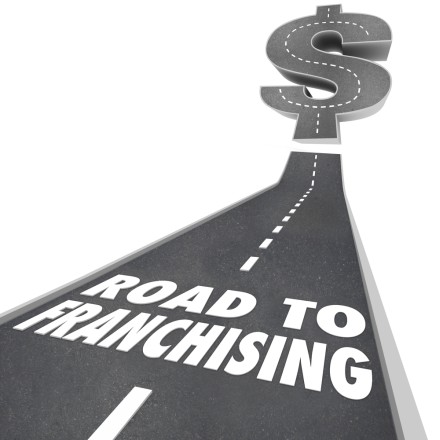Should You Consider Franchising as a Career Path?
Post Views 2Learn how to get in and get established in the world of franchising.
How many times have you stood in line at Dunkin Donuts, salivating at the thought of a Coolatta-and wondering who’s getting rich off your obsession with frosty caffeinated drinks? Who is that someone, and exactly how rich is he or she getting, anyway? And where do you sign up? Below, insiders at some of the world’s top franchises spill the beans on what it takes to be successful in their business. If you have an entrepreneurial mind, some business experience, a small wad of cash, and a healthy respect for established brands, take a closer look.
If you’re ready to start looking at opportunities to start a franchise in your area, click here to see what’s available.
Overview
By definition, a franchise is a business established or operated under an authorization to sell or distribute a company’s goods or services in a particular area. Most people associate franchises with food establishments like Pizza Hut or Burger King, but many other businesses operate on the franchise system as well, including dry cleaners, tanning salons, fitness centers, and home furnishings stores. (Note: The mere fact that a company has a gazillion locations does not mean it’s up for grabs: Some, like Starbucks, do not franchise to individuals at all.)
The Franchise 500, an annual rankings list produced by Entrepreneur magazine, identifies the world’s top franchises based on a number of factors including financial strength, growth rate, and size. Topping the 2006 list were Subway, Quizno’s Sub, Curves, The UPS Store, and Jackson Hewitt Tax Service.
Who are the owners of these outlets? There’s no easy answer. Some are people who have simply grown weary of the corporate sector and want to take their shot at being the boss while protected by the built-in brand infrastructure that comes with a franchise. Cynthia Booth left a lucrative 18-year commercial banking career to become owner/operator of five McDonald’s restaurants in the Cincinnati, Ohio, area. “I always had the desire to own my own business,” she says. “I conducted extensive research on various opportunities, and McDonalds had the most to offer me.” Booth completed the application process and 18 months of training while still working full-time as a senior vice president at a bank.
Some successful franchisees have a postgraduate degree; others have only a high school diploma. There is a whole gamut of people in our system, says Jim Sullivan, vice president of franchise and real estate development for Friendly’s. Restaurants are unique some people start working here in high school and just stay with it. It’s the only industry I know where you can start out as a dishwasher and end up as president of the company.
Getting in, Shelling Out
Step one of becoming a franchise owner is to do some serious homework on the company you’re interested in and the industry in which it operates. Before you get involved, go work in the industry you’re interested in, advises Joseph Kane, president and CEO of Cendant Corporations Days Inn hotel chain. Do you have a passion for what drives the business? Do you know what the demands are, what the hours are? Go work at a restaurant, a hotel, or whatever and try it on for size.
Typically, aspiring franchisees fill out an online application and then interview with a franchise representative from the company. A potential owner needs to have a certain net worth and liquid asset pool to get the business up and running. Start-up costs vary significantly based on numerous factors, including location, size, and type of franchise. Much of that, however, can be financed in various ways, such as Small Business Administration loans. Some organizations have fairly low costs: The UPS Store, for instance, requires a liquid-assets level of $50,000. We are more concerned with a person’s debt-to-asset ratio, says a franchise sales manager at the company.
Others demand steeper initial investments. Start-up costs at ice-cream purveyor Cold Stone Creamery range from $250,000 to $400,000, in addition to the security deposit on the property’s lease. While the minimum liquid assets are $125,000, the company won’t eliminate someone who falls short. Well usually suggest third-party financing options, says Cold Stone’s vice president of franchise development. The most enthusiastic applicants will typically go out and find the investment dollars needed to get started.
To apply to be a franchisee for Regis Corporation, which operates Supercuts, Cost Cutters, and Pro-Cuts hair salons, you’ll need to have a net worth of $300,000 with $100,000 in liquid assets, says the vice president of franchise development. Friendly’s, on the other hand, looks for a much bigger bank account: Our minimum financial requirements include a net worth of at least $1.5 million and liquid assets of $650,000, says Sullivan. We look for a sophisticated individual or group that can meet and maintain this level of capital throughout the process. Friendly’s prefers operators who have multi-unit restaurant experience. Real estate and development savvy is important, too, since they are expected to be thoroughly familiar with local markets.
Organizations that operate multiple brands can often offer potential franchisees a range of options depending on their experience and financial position. Dunkin Brands, which operates Dunkin Donuts, Baskin Robbins, and Togo’s, has a separate strategy for each brand, which affects the level of financing required. Since we have a spectrum of options, we can look at where a potential franchisee might fit into the organization, says vice president of franchising. In the Dunkin Donuts operation, the cost of business in certain markets is very high, so it makes sense to look for a larger financial statement. We also look for individuals or groups who can develop five or more stores right out of the gate. On the Baskin Robbins side, however, the prototypes are smaller, the operation process is easier, and the cost of entry is lower.
Click here to see the franchise options in your area and to get started!
Making the Cut
When you fill out an application to become a franchisee, the company will review it and send out a Uniform Franchise Offering Circular required by law which details all the information about the opportunity. Usually, the company will also send you a contact list of other franchisees in the system. As an applicant, you can contact them to get their perspective and inquire about P&L statements, earnings expectations, etc. During the awarding process, we focus on keeping the potential franchisee 100 percent informed, says Cold Stones franchise director. We look to share the good, the bad, and the ugly, so that people know what they are getting themselves into. In general, a franchisor cannot disclose specific salary or revenue information, but will encourage interested parties to consult with existing franchisees in the same area, who can share financials and provide an indication of expected returns.
Companies will often place candidates in an existing store location and evaluate on-the-job performance. Successful applicants are subsequently given extensive training. At some companies, this involves substantial off-site classroom experience. Cold Stone, for example, has applicants attend Cold Stone University in Arizona to learn accounting, record keeping, policies, and procedures, while McDonalds boasts Hamburger University, a worldwide management training center in Oakbrook, Illinois. At Dunkin Brands, franchisees learn how to write business plans, secure financing, and make the transition from being a one-unit operator to a multi-unit operator.
While some companies, like Friendly’s, require substantial real estate knowledge in their franchisees, many have a dedicated real estate department to identify prime locations for new stores. We have a real estate group that will investigate every site that we recommend, well before we recommend it, says The UPS Stores director of franchising. We handle all of the demographic research to make sure a site meets our criteria. Our franchisees don’t have to do the legwork.
Time Commitment
Different franchises require different levels of time commitment and on-site presence. It can even vary by brand within a company. We expect most franchisees to be on site for Baskin Robbins, but for Dunkin Donuts, you would likely hire managers and an operations team to assist you. The number of hours you work is dependent on several factors including the number of stores you operate, their location, the quality of your staff, and the amount of energy and commitment you choose to put into the operation. Some franchises are more time consuming than others. At McDonalds we are not absentee owners, remarks Booth, who says she is physically present, in her restaurants almost daily.
Some companies allow franchisees to operate their businesses while keeping their day jobs, thus enabling them to receive a second source of income. We feel that It’s a point of differentiation for us, says the Regis Corporation. It’s a lot of hours, but as the business settles in and you hire the right people, the commitment will lessen. So we don’t require our franchisees to give up their existing salaries.
Success Factors
Besides an entrepreneurial spirit and business acumen, perhaps the most important factor in this business is the recognition that, at the end of the day, you’re part of a much larger organization. There is such a thing as being too entrepreneurial in this industry. You must be able to follow the guidelines of the franchise, says McKee. As a franchisee you are buying the right to use a brand owner’s name, and the customer should not see where one starts and the other ends.
Aggressive followers are the most successful in this business. A true entrepreneur might find this business challenging. Aggressive followers, on the other hand, are good at business yet understand that they operate within franchise restrictions. They don’t try to go off on their own and do their own thing.
As with any business, adapting to change is very important. In the hospitality industry, no day is the same. So a smart team that recognizes change in the marketplace is the most successful, says Days Inns Kane. Suppose it snows heavily tonight in one hotels area; they’ll fill up but then down the road there will be an empty hotel because people who made reservations there couldn’t get to the destination. So that hotel will have to lower rates to get more business in the door. Our owners have to be able to deal with things like that.
Once you’re successful, what next? Franchisors encourage their top owners to advance their position by expanding ownership to multiple locations. Thirty percent of our stores are owned by multiple-center owners, says The UPS Store.
Some companies even allow franchisees to play a role in the direction of the company. Owner/operators often have a seat at the leadership table and can take part in the decision making process, says McDonalds franchisee Booth. In fact, the Big Mac and the Egg McMuffin are both ideas that came from owner/operators. So will a franchise be your one-way ticket to boundless prosperity? As one insider puts it, opening a franchise isn’t like buying yourself a vacation. But done right, it can certainly buy you a substantial level of control over your future with a support system that most other entrepreneurs don’t have when launching their ventures.
Reality Check
- Myth: I will operate on my own terms independent of any authority.
- Reality: As a franchisee, you are essentially promoting the brand of another company. In this way, you do have accountability to a corporate body, that in some cases will impose a strict set of guidelines within which you must operate.
- Myth: As an owner, I will never work behind the counter at my store.
- Reality: Many franchise operations require an owner to have a very hands on presence. It is important to understand up front how much on-site work will be required to be successful.
- Myth: I don’t have a graduate business degree, so I won’t be successful as a franchisee.
- Reality: Most franchises do not have a minimum education requirement. Your ambition will take you where you need to go in this industry. That said, be sure to take advantage of the training programs that franchisors offer, especially in areas like accounting and operations.
- Myth: Once I hire and train a good manager and employees, I can pretty much let them run the show.
- Reality: This is a business; even when you’ve dotted all the i’s, there is always something else to think about. One ice cream concept franchise owner notes that his biggest issue is making sure his employees don’t put too much ice cream in each scoop. Customers walk away happy, but the more product goes out the door, the sooner supply runs short and he loses money.
Are you ready to get started? Click here to see the franchise opportunities in your area and get started today!
Should You Consider Franchising as a Career Path? by Harrison Barnes



 Marketing Jobs and Brand Manager Jobs: How to Get Into Marketing and Brand Management
Marketing Jobs and Brand Manager Jobs: How to Get Into Marketing and Brand Management  How to Get Into Investment Banking
How to Get Into Investment Banking